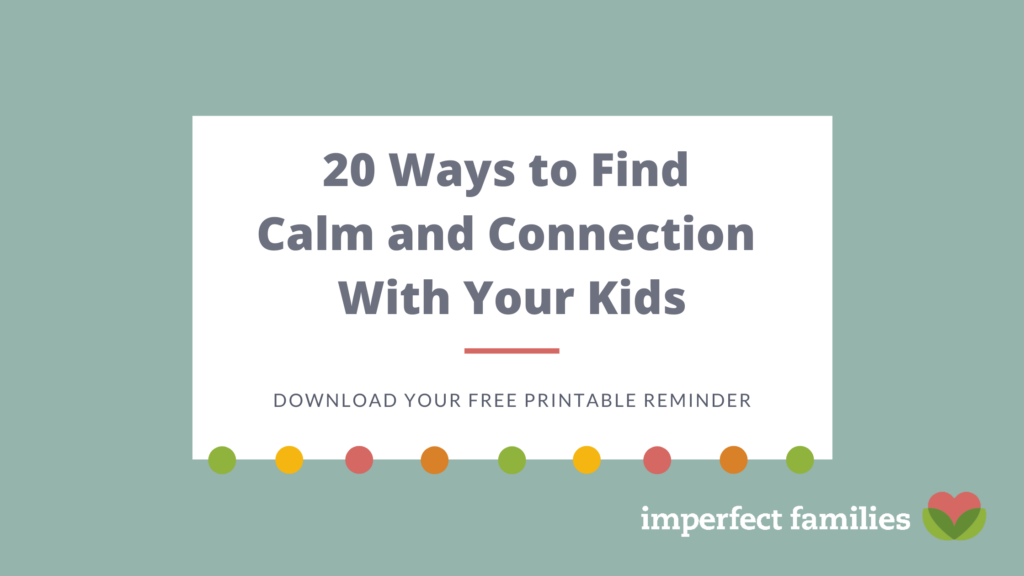“Mom! Sam won’t turn off the water in the bathroom!”
“Mom! Sarah took my iPod without asking…and now she won’t give it back!”
“Mom, Mom, MOM!”
Like nails on a chalkboard, most parents have come to dread the sound of a child tattling.
It seems so needy, so desperate. Why can’t they just work it out on their own?
Because it is. And they can’t.
Rethinking Tattling.
Our thoughts about tattling usually sound something like…”She’s just looking for attention” or “He needs to mind his own business.”
These thoughts lead to responses like, “If you’re tattling, I don’t want to hear it.” Or, “That’s not your problem, go find something else to do.”
As parents, we have an internal drive to help our kids become independent, to think for themselves and solve their own problems.
This is a great goal, but it’s often at odds with what your child is actually able to do.
Let’s back up and see things from your child’s perspective…
Your daughter is walking by the bathroom when she sees her brother playing in the sink with the water running. She knows that you don’t like them wasting water, so she heads into the bathroom and says, “Turn off the water. Mom doesn’t like us leaving the faucet on.”
Her brother totally ignores her and continues playing. She gets a little more worked up, “Turn it off, Sam! Come on!” But, of course, he could care less about her warnings.
Realizing she can’t change her brother’s mind on her own, she comes to find you, “Mom, Sam won’t turn off the water in the bathroom!”
How do you respond?
A simple phrase.
Now that we know the backstory, we can see that your daughter has some concerns: her brother’s wasting water and he’s breaking a house rule. She tried to fix the situation on her own, but her solutions didn’t work.
She’s still carrying around these concerns, and she decides to share them with the one person she believes can handle the situation: You.
Instead of seeing her has a child seeking attention or someone who is not minding their own business, repeat this phrase:
“She needs my help.”
This phrase allows you respond in a way that addresses her concerns and reinforces your role as the confident caregiver.
You may decide to say, “Sounds like you’re worried he’s wasting water. Thank you for letting me know.”
Or, you might say, “He went to wash his hands after lunch, looks like he got a little distracted. I better go check on him.”
Or, maybe, “I’m glad you came to me for help. Let’s see if we can think of a good solution.”
In some situations, you may work together to create a solution or talk about how to handle it next time. But sometimes, you may just step in as the adult in charge and relieve her from having to manage something that falls outside of her role as a child.
Why this works.
You may be thinking, “Wait. What? Won’t this encourage tattling?!”
If you’re hoping to grow confident, independent, problem-solving kids, they are going to need to learn these skills first.
And, the best way to learn these skills is in a strong relationship with a caregiver.
Think of yourself like the “base” in a game of tag. Your child runs into all sorts of situations in the world, some he handles with ease, but others are a little more difficult. When he comes to you, it’s like resting at the “base.” It’s safe, he’s protected and he no longer has to figure everything out because you’re there to help him through it.
As your child feels supported, they are empowered to handle situations or say, “Hey mom, I need your help.”
Which means…less tattling!
Yeah, but…
- “Yeah, but I think some of the tattling is for attention.”
If that’s the case, the solution is to give your child what they need: attention. Once this need has been met, they no longer have to use tattling as a round-about way to have time with you.
- “Yeah, but sometimes they do need to mind their own business.”
OK, then let’s teach them some skills and strategies to use in these situations. Telling them not to get involved isn’t working, they have concerns! Listen, be empathetic, and then work together to find an acceptable solution.
- “Yeah, but I have 4 kids, I can’t be helping them work out every little thing!”
True, it may be a lot at first. If your children are coming to you multiple times each day, it may be a sign that they need more support to get along with their siblings or to solve problems. With your help, they may have less problems to report. It may also be a sign that they just want to connect with you individually, so it may make sense to increase the one-on-one time with each child.
Need more support?
Reading a post and putting it into practice are two different things. Sometimes, we need support and accountability to get on the right track – and stay there!





Comments have been turned off to retain the privacy of all families. If you have a question or comment on the topic, you're always welcome to contact me.